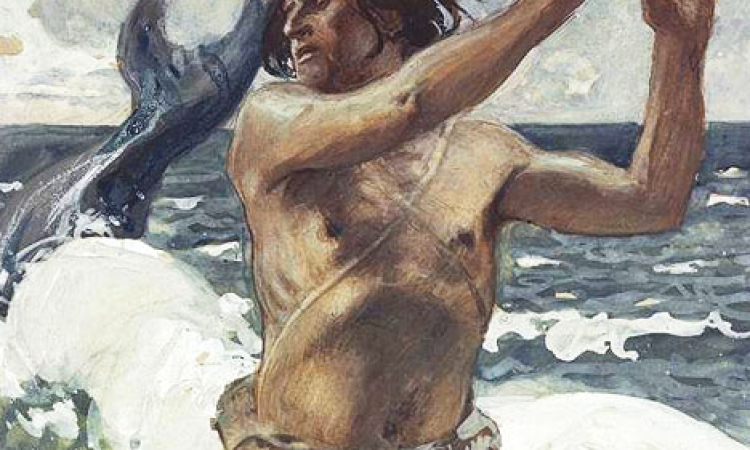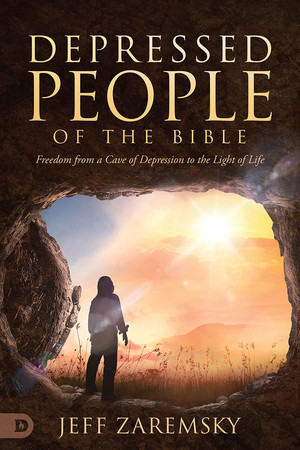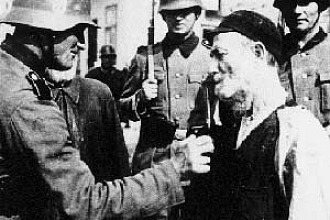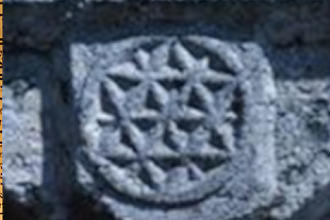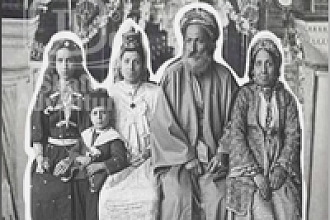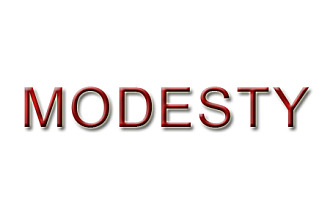Jonah was in many ways like you and me. He was not called to lead the masses like Moses. He was simply called to tell his neighbor what God said. Isn’t that what God asks of each of us?
We don’t have any knowledge of Jonah’s upbringing or lineage, so we do not know if hits one or two apply to him. But we do know enough about Jonah to identify at least a few possible hits and certainly at least one.
Our introduction to Jonah begins with God telling him to go to the large metropolitan city of Nineveh and to pronounce judgment upon the people because of their wickedness. Nineveh was a great, large, wicked city that was not even in the land of Israel. Actually, it was quite far from Israel. Nineveh is still in existence today in the country of Iraq. It was not a Jewish city. The inhabitants were Gentiles. Jonah would be a foreigner with no national protection. He would be proclaiming to a city that did not believe in his God that his God was going to destroy them.
Jonah was called to a very dangerous assignment. You can probably think of some cities in the world that would fit this description. What would you do if God called you to go to one of them and tell them your God said they were going to be destroyed?
Jonah was not being asked to merely knock on his friendly neighbor’s door and invite him to come to services. He was being commanded to go to a city filled with people who would have no problem killing him and leaving his body to be eaten by dogs. Not only was Nineveh a large and wicked city far from Jonah’s homeland in another country, it also had not shown itself friendly to Jonah’s nation or people. As a matter of fact, it had been very hostile to Israel and may have been responsible for the deaths or capture and enslavement of people Jonah knew, perhaps even relatives and loved ones of Jonah.
Jonah made a negative frontal lobe conscious decision to resist God’s will. Rather than stepping out in faith, Jonah responded to his fears and went in the exact opposite direction of Nineveh. Jonah boarded a ship headed away from Nineveh toward Tarshish.
Instead of allowing Jonah to just run away from the Lord’s service, God chased after him. Certainly God could have found someone else just as willing, or unwilling, as Jonah to go to Nineveh. This assignment was as much for Jonah’s benefit as it was for Nineveh. In His love for Jonah, God was not going to let him out of this task. Much, if not all, of what we are called to do in life is for our benefit in the long run.
“The Lord sent out a great wind on the sea, and there was a mighty tempest on the sea, so that the ship was about to be broken up” (Jonah 1:4). The storm was so violent that strong, tough, experienced sailors feared for their lives. They cried out to their gods for help and cast their precious cargo overboard. Throughout all this turmoil and noise, Jonah was sleeping.
You might ask, “How on earth could Jonah be sleeping with all that noise from the wind, the rain, the thunder, the sailors crying out, and the sailors running around the ship hauling, dragging, and throwing large pieces of cargo around?” Jonah was in a deep depression and slept through it all in the dark bottom of the ship. Even if he did occasionally awaken and heard the storm and the sailors crying out, he might have thought to himself, “Good, if this ship sinks, at least this emotional pain will end.”
Have you ever been so despondent that all you wanted to do was hide in a dark room or to isolate yourself from other people? Have you ever dipped so far down that you no longer cared about your life or the safety of others? Have you ever been so depressed that all you could do was sleep? If so, then you can relate to Jonah.
While we can’t know all of Jonah’s hits, we can surmise a few of them. He had a frontal lobe hit for resisting God’s will. We can imagine him boarding the first ship heading out and getting on the ship in as quick a fashion as possible. In all that hustle, his circadian rhythm could easily have been out of whack. It is hard to imagine that ship having a fancy dining hall serving seven-course meals, so his nutritional balance could have been off. The ship’s captain found him in the bottom hull of the ship, so he might not have been getting fresh air or sunlight. Can you think of any of the other hits or sub-hits Jonah might have been experiencing?
It is not one night’s sleep or one insufficient meal that will cause a hit, but in these accounts of depressed people of the Bible we are only given the bare facts, not every detail of their lives. We are not analyzing these people from the Bible, we are just looking at possible scenarios so we can learn lessons for ourselves.
It is easy for us, in our self-denial, to think we only had one insufficient meal or only one night’s bad sleep, when in reality it was several or many. If you ever had the thought, “That could never happen to me,” that is a good example of self-denial.
The sailors asked Jonah to tell them something about himself and he answered in a very interesting way. Jonah replied, “I worship the Lord God of heaven, who made the sea and dry land” (Jonah 1:9 Contemporary English Version). This was not entirely a true statement. Jonah may have professed to worship the Lord and he might have done so when things were easy, but it is hard to truthfully say we are worshiping the Lord when we are in open disobedience to Him.
That applies to us as well. You may be praying, you may be reading the Bible, you may be singing songs of praise to God, you may be attending services, but if you are just going through the motions, you are not worshiping Him. Obeying Him would include allowing Him to live in your life, to empower you to live the life the Bible outlines. I am sure you have been gratified and enriched as you have seen Him bringing your life into harmony with the great teachings of Scripture. Seeing Him at work within us draws forth an attitude of worship.
Worshiping God also includes sharing God’s love with someone else. God has called all of us to share His love with others. We become His hands to help, His feet to go, His mouth to share, His heart to love and care. We become His representatives, His ambassadors. What a privilege it is to be a representative of the Lord, the God of heaven, the Creator of the sea and the earth! If fear is the reason we are not moving out in faith, we can confess fear to the Lord, and He will remove it and replace it with His power. Regarding fear, God has given us a wonderful, powerful Bible promise: “God has not given us a spirit of fear, but of power and of love and of a sound mind” (2 Timothy 1:7). Accept God’s victory over sin, worry, and fear right now; accept His power, His love, and His sound mind.
Jonah’s understanding of God was not complete. When Jonah told the sailors he was running away from God, the sailors asked him what they could do to calm the storm. Jonah responded, “Pick me up and throw me into the sea; then the sea will become calm for you. For I know that this great tempest is because of me” (Jonah 1:12). Jonah’s response showed he had not yet known of or experienced God’s mercy and forgiveness. Jonah felt hopeless because he did not yet understand that God loved him personally and called him because He believed in him. Jonah saw the storm as a punishment, as opposed to being sent by a loving God who valued Jonah and did not want him to run away from Him. In this state of depression and without faith in a loving God, Jonah became suicidal and asked the sailors to throw him into the sea.
You might be going through a tempest in your life right now, and it might be in part because of choices you have made. If that is the case, God did not send the tempest to punish you, He allowed it to draw you to Him, to get you back on course. He allowed it not because He is angry, but because He loves you. He values you. He has a plan and a purpose for you.
Jonah seemed to have forgotten the accounts of Joseph and Job, that in every calamity God has a purpose and a plan. Because he did not remember these things, Jonah didn’t realize this storm was actually for his good. Jonah must have forgotten how God accepted Jacob’s, Moses’, and David’s repentance. He seemed to think the only way to stop the storm was by his death.
God did not want Jonah to die. He wanted him to repent of his sin and receive His forgiveness through the sacrifices offered in the Temple representing the Messiah’s death. God wanted Jonah to accept the power of the Holy Spirit to take away his fear and cause him to be obedient to God’s will for his life. If God’s biggest interest was in accomplishing a task, proclaiming His judgment on Nineveh, He would have said, “If Jonah doesn’t want to do my bidding and go to Nineveh, I will fire him or let him quit, let him run, let him be thrown overboard and drown, and I will get someone else who will do My will.” But this story is not as much about God’s concern about Nineveh—although God loved the people of Nineveh as well—as it is about God’s love for Jonah.
God’s calling and commands to us are not so much about accomplishing some action or fulfilling some duty. It is about God developing us into all that He wants us to be, a people who love and truly worship Him in heart, mind, and soul, in spirit, truth, and action. Whatever problem or duty you are called to face in your life, it is part of God’s love for you, to grow you in His plan for your life. Do you believe that God loves you even when times are difficult, even when you are fearful and even when you are running from Him? Is there some area in your life where you need to receive God’s forgiveness and love right now?
The sailors resisted throwing Jonah overboard as long as they could, but finally they gave in and tossed him into the sea. God did not let Jonah off the hook; He used a fish to catch Jonah. This is not your typical fishing trip, yet Jonah certainly had a whopper of a fish story to tell! God loves us even when we are being disobedient and running away from Him. God did not give up on Jonah or Nineveh—and He will not give up on you, me, or any of our loved ones.
A fish’s belly is likely one of the darkest places. Jonah was there for three full days. His diet might have been limited and his circadian rhythm could very well have still been way off, but Jonah did something to bring himself out of the depression. He made a good frontal lobe decision. He began to accept God’s love and cried out to the Lord. Like Moses alone in the wilderness, it was when Jonah was alone in the belly of a great fish that He really heard God calling out to him in love.
Maybe that is all you need right now to snap out of depression. Regardless of what you have done in the past, regardless of what others have done to you, and regardless of whatever fish’s belly you are in right now, choose to believe that God loves you with an everlasting love. Accept His mercy and forgiveness. Accept His love demonstrated in the Messiah. Accept His power to move forward in obedience to His commands. If you are having a hard time choosing and believing such things, you can cry out to God, “Lord, I believe, help my unbelief!” Or you can even cry out, “Lord, I don’t believe, give me faith!”
God mercifully had the fish spit Jonah out on dry land. God, in His love for both Jonah and Nineveh, called Jonah to go to Nineveh. God had not forgotten how this calling would benefit both Jonah and Nineveh, so He reminded Jonah again of His command for Jonah to go and warn Nineveh. This time Jonah obeyed and got plenty of exercise and sunlight traveling all the way there. (I hope he had a chance to shower first. Smelling like fish food is not a recipe for a good first impression.)
Jonah began walking through the city proclaiming the message of God. The Spirit of God softened the Ninevites’ hearts and they truly repented of their sins. What a powerful experience, and to think that Jonah was reluctant to go!
It would be interesting to see how many powerful experiences God has in store for us when we reject fear and accept God’s power, love, and a sound mind.
As the city was repenting, Jonah found a nice spot on a hillside to watch the fireworks. This was going to be better than the destruction of Sodom and Gomorrah. Again, Jonah might have had family and friends who were killed or hurt by these people. He may have been looking forward to seeing God’s revenge on them. But God did not destroy the city. He accepted their repentance. This “displeased Jonah exceedingly, and he became angry” (Jonah 4:1). Jonah began to accept God’s love for him and became outwardly obedient, but he did not receive God’s love to the point of being able to forgive and love others.
Jonah made a wrong frontal lobe decision and chose to be unhappy about the outcome and even angry at God. These negative thoughts threw Jonah over his four hit limit again and he again became suicidal, even to the point where he said, “It is right for me to be angry, even to death!” (Jonah 4:9). Anger and bitterness are very dangerous feelings to harbor.
Unfortunately, that is basically where the story ends for Jonah. God made another plea for him, but the Bible does not record Jonah’s response. Fortunately, our stories are not over yet. God is still pleading with each of us, because He loves us.
The book of Jonah shows God’s love for the city of Nineveh, which had caused so much heartache and pain to people who were following God. It also shows God’s love to Jonah, who professed to be following God, but whose life did not always line up with that profession. The account of Jonah and the city of Nineveh might not have been primarily about God’s love for either of them; it might be about God’s love for you and me.
One of Jonah’s big problems was bitterness. Two of the ways bitterness can manifest itself are anger and sadness. We can demonstrate the anger with hurtful words or actions, or we can hold the anger in and it can lead to sadness and depression. (This is not to say all depression is a result of holding onto bitterness.) Sadness and anger, as a result of bitterness, are two sides of the same coin. Whether you have allowed bitterness to become bursts of rage or self-pity and depression, you are the only one who can reverse the cycle by choosing to allow God to give you the ability to rise above the wrong that someone else has done.
Forgiveness is the recognition that God is stronger than the people who have wounded us. Forgiveness is the recognition that God is stronger than the past. Choosing to forgive—giving the frustration, anger, and hurt over to God—brings healing to us.
This does NOT mean you are saying people are right or directed by God to do evil. Actually, by forgiving we are calling out their wrong. We do not forgive people for doing good things. We only forgive people for doing bad things. Forgiveness does not mean, “It’s okay.” When someone does something wrong it is definitely not okay. Forgiveness does not mean we will or that they should “Forget it.” No, both we and they need to remember and learn from that wrong so that it is not repeated against us or against anyone else.
Forgiveness does not mean punishment will not be enacted against the wrongdoer. The financial term “debt forgiven,” indicates a debt is absolved and does not have to be repaid. This is a very erroneous application when it comes to biblical forgiveness. When a wrong is done to us, we can be forgiving and at the same time still expect the offender to pay back the debt, make the wrong right, lose privileges, be put in jail, or receive the appropriate discipline and punishment for the wrong they did. Even when God forgives us, He does not just wipe out the debt. The debt must be paid, and the payment required for sin is death. Not only the death of the Messiah, but a death on the part of the sinner—a death to sin, a death of the carnal nature of the sinner. We, our natural self, must die with the Messiah.
Then we become born anew, with new hearts, new minds, new thoughts, and new desires. God replaces our old self with the mind of Messiah; He fills us with His Holy Spirit and He writes
His laws into our hearts and minds. He changes us and empowers us. All things become new. We are not helpless victims. We are empowered overcomers.
When we choose to forgive, we are choosing not to hold on to anger and bitterness. When we forgive we are saying, “Someone did something wrong, they did something bad. I do not want them to ever do that again to me or to anyone else. That wrong might even entail some type of punishment against them. But I choose not to hold onto angry, bitter, hateful feelings against them because of their wrongs. I am not going to allow their wrong, hurtful choices to take away my joy. While I may have to bring criminal charges against them or take them to court or expect a compensation for the damage they did, I ultimately trust that God will deal with them. I choose to pray for them so that they can receive God’s forgiveness and love. I am willing to allow God to use me to reach them if He so chooses. Their wrong is their problem. I choose not to let it become my problem. I choose to trust that even the negative physical, financial, or emotional effects that their wrong choices have had on me will be worked out together for good by God, who is bigger than all that happens in this world.”
When we say, “I am willing to allow God to use me to reach them if He so chooses,” we should add a word of caution. God did not call everyone who was hurt by the Assyrians to go to Nineveh. It is not always wise or safe or God’s will to be the one to demonstrate God’s love to the offender. There are many cases of employment, marriage, family, or social abuse where a codependent person remains in or goes back into the abusive situation under a pretense of forgiveness and an attempt to help the abuser. There are major differences between codependency and biblical forgiveness. Biblical forgiveness does not give someone a license to continue to hurt us. When there is danger of continued abuse, we may not be the one to be able to help them. Jonah was not called to “move in” with the people of Nineveh. He was called to warn them.
We do not have to wait for them to apologize before we forgive them. Remember, forgiveness is not letting them off the hook; it is an acknowledgment that what they did was wrong, that I am not going to allow their wrong to steal my peace, and that I will not respond with vengeance even if I have to make sure justice and punishment is enacted. Thus, forgiveness is more for our sake than for their sake. While our forgiving them does not release them from guilt or punishment, it does release us from anger and bitterness. If we wait until they apologize before we choose to forgive, then we are allowing them to decide when we will be released from the anger and bitterness that is destroying us. If we wait for them to apologize before we forgive, we are allowing them to control us, we are allowing them to continue to hurt us.
And what if they never apologize? What if they die before we do and never apologize? That would be the ultimate control wouldn’t it. We would then be eternally stuck with anger and bitterness. That is why it is better to choose to forgive them right away. It is what God has done for us. “God demonstrates his own love for us, in that the Messiah died on our behalf while we were still sinners” (Romans 5:8 CJB). He forgave us even before Adam and Eve sinned, before we were even born. He is “the Lamb slain from the foundation of the world” (Revelation 13:8). As we accept His Spirit into our hearts, He will give us the ability to have pre-forgiveness toward those who hurt us.
Actually forgiving someone before they apologize can lead them to apologize. If we said to someone out of the blue, “I forgive you,” their natural reaction would be, “What wrong did I do that you are forgiving me for?” Forgiving someone brings conviction to them that they did something wrong.
When they do apologize, our reaction should not be to say, “Oh, it’s okay.” We should be able to say, “I have already forgiven you.” Under certain circumstances we could add, “This is going to be the consequence for doing that wrong…. How do you plan on changing so that it does not happen again?”
Do you need healing from feelings of hurt, bitterness, anger, or resentment so you can accept the gift of peace and trust in God right now? Just ask God to take away those harmful feelings of self-pity and sadness, or of hatred and revenge. Now choose to thank God that He has taken those hurtful feelings away. You can do this by faith. That means thanking God for removing those hurtful feelings whether you feel any different or not.
Now ask God to replace your feelings that are hurtful (that He has just taken away), with feelings of joy, peace, and contentment. Ask Him for a godly pity for those who hurt you. Also ask Him to give you faith that He will eventually work this out for good, knowing that in His time He will bring punishment for evil. Continue to ask for this every time those sad or angry feelings come back. Eventually they will stop disturbing your peace, and the Lord will have full control of this area of your life. He has done this for others; He can do it for you. People will soon start noticing the difference God is making in your life.
Pause, Ponder, and Proceed
-
- If you are running away from doing something you know God wants you to do, ask God to forgive you, accept the Messiah’s death for your mistake, accept His forgiveness, and accept His power to do what is right.
- Can you think of a time when God allowed some “storm” to come into your life, and now you see it as God’s loving attempt to try to get your attention and turn you to Him?
- If you have been having a hard time believing that God loves you personally, say out loud, “Lord, I believe, help my unbelief.” Or, “Lord, I don’t believe, give me faith.”
- Have you ever gotten angry when you have seen God be merciful or beneficial to someone who was not nice to you or others? If so, and if you have not yet repented of that, thank God for showing mercy to them and claim His mercy upon yourself.
- Have you ever been reluctant to forgive someone because you were taught to believe that forgiveness meant they would be released from accountability? Are you now seeing that true biblical forgiveness holds them accountable and also releases you from bitterness and anger?
- If you are thankful for this true understanding of forgiveness, thank God right now.
- If someone has hurt you and you have not yet forgiven them, choose right now, by God’s power, to forgive them. (If you are still having a hard time doing that, ask God to give you the ability to forgive them as God has forgiven you.)
- If you are in an abusive situation, ask God to give you the strength to get out of it.

